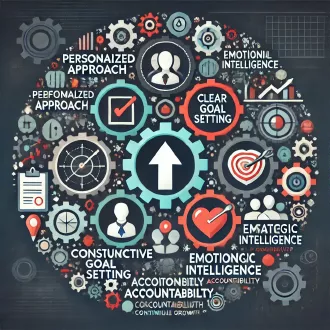Transcription Spends time in reflection and ensures understanding.
Let's talk about reflective listening skills, also known as rephrasing. While the terms may vary, the process is similar. When we listen to someone, we hear them, but have we really understood the meaning behind the words? Have we grasped what they are thinking, their genuine emotions or underlying judgments?
Often, full understanding is not achieved by just listening to the sounds coming out of the other person, but by listening to the deeper meaning behind what they said. To clarify this, it is helpful to practice afterthought and rephrasing. It's kind of like giving the words back to the other person, showing them what you understood. For example, "I understood that you are feeling discouraged lately... Is that what you are expressing?" or Do you mean that you doubt the importance of your project... Is that it?
The victory in this reflection process lies not in being right, but in learning more and understanding better. By rephrasing or reflecting on what you think the other person has said, especially if you are wrong, you provide an opportunity to clarify and deepen understanding. Sometimes people struggle to express what they have inside, and reflection gives them space to think and explain more clearly.
This technique demonstrates that you are truly attentive and making an effort to understand. Although there may be misunderstandings, the person will appreciate your efforts to understand their thoughts and emotions. Reflecting on their own words also gives them the opportunity to reevaluate their thoughts. This is a valuable tool to help the coachee express their emotions, especially when they may be struggling to do so.
Some useful phrases to begin the reflection from what you have heard include:
- In other words...
- Because of what you say...
- Why you say...
- From what I understand, you are saying....
The main goal in practicing rephrasing is to be sure that you understood correctly what you are hearing, but remember that this process can lead to deeper conversations. As you reflect on what you think they have said, they may feel encouraged to explore deeper, underlying themes. Instead of focusing only on surface words, you will be inviting them to talk about what really matters and why they are having these conversations.
Ensure understanding
Key aspects of ensuring mutual understanding include:
- Pauses for reflection: after a meaningful discussion, take pauses to allow the coachee and you to reflect on what has been shared. This helps process information and emotions.
- Check questions: ask questions to confirm that you both have an accurate understanding of what has been discussed. This avoids misunderstandings and future confusion.
- Paraphrasing and summarizing: Repeat and summarize the key points of the conversation in your own words. This confirms that you are getting the essence of the message.
- Use of examples: Use concrete examples to illustrate the concepts discussed. Examples help
reflection




